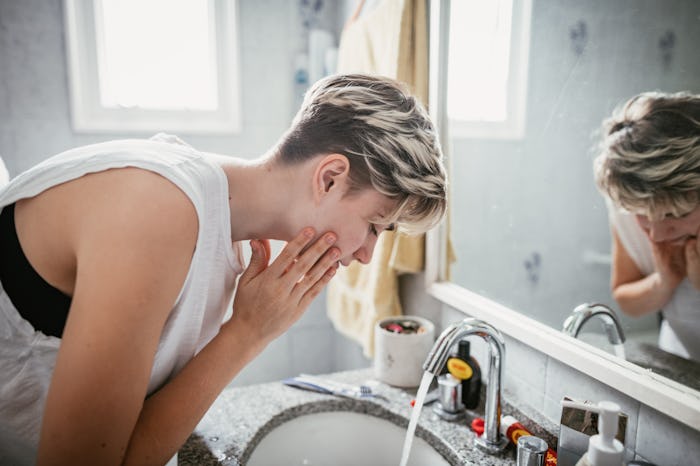Life

Hey Mom, Here's Why Showering Is So Important For Your Mental Health
When people think of self-care, they usually think of luxurious massages, face masks, getting your hair and nails done, going on a vacation, or just taking a long bubble bath. But the ways you show yourself some love don't have to be expensive or out of reach: Good hygiene can be a form of self-care, according to experts, and a little bit goes a long way when you're a new mom.
I’m a little ashamed of how often I forget to shower. Between the physical and mental load of motherhood, it usually falls to the bottom of my priorities list, and this feeling of mine is pretty typical for most moms, according to Dr. Stephanie Wong, a licensed clinical psychologist. As we focus our attention to taking care of our baby, we tend to put ourselves last. "However, these moments of self-care are crucial because these acts help maintain a stable mood, motivation, and engagement in activities — including caring for one's infant," she says. Plus, "if we are not taking care of our hygiene, it tends to be an indicator of a declining or depressed mood," she says.
Katie Lear, a licensed clinical mental health counselor who works with parents and kids, echoes Wong's expertise. Fun and luxurious forms of self-care are great, but it's the daily healthy habits that have a significant impact on mood and mental health in the long term. "Make sure that you are regularly engaging in forms of hygiene that prevent illness and physical health problems as part of your self-care," she says. Healthy habits include brushing and flossing your teeth regularly, washing and combing your hair, bathing, and even doing laundry. "Although it may not be as immediately linked to health, sleeping on clean sheets just feels good and can't hurt either.”
Basically, don't underestimate the power of a taking a shower. Lear says, "Activities that help us to be more attuned to our senses are often very soothing, and the added sensory input can help people feel more grounded and mindful rather than just completing the activity while worrying about something else." A perfect example of this? Taking a hot shower. "It helps you accomplish an important aspect of self-care, but the act of showering is also a relaxing sensory experience," says Lear.
Another hygiene-related task that you should try to focus on is changing your clothes every day, lest it start to feel like Groundhog Day, as Wong puts it.
Even though the initial phase of motherhood has its ups and downs, and you absolutely deserve to enjoy all the self-care rituals from body masks to yoga retreats, it's not always possible to sign up for such activities at the drop of a hat. So focusing on seemingly mundane tasks, like bathing and brushing your teeth, can actually help energize you and make you feel a little bit more like yourself.
If you or someone you know is experiencing depression or anxiety during pregnancy, or in the postpartum period, contact the Postpartum Health Alliance warmline at (888) 724-7240 or Postpartum Support International at (800) 944-4773. If you are thinking of harming yourself or your baby, get help right away by calling the National Suicide Prevention Lifeline at 1-800-273-8255 or dialing 911. For more resources, you can visit Postpartum Support International.
Experts:
Katie Lear, licensed clinical mental health counselor, registered play therapist, and registered drama therapist
Dr. Stephanie J. Wong, licensed clinical psychologist
This article was originally published on